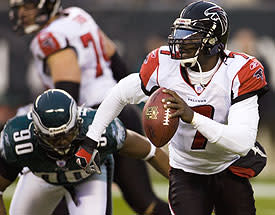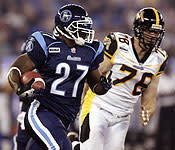Seven on No. 7: The future of Vick
INDIANAPOLIS – The Atlanta Falcons created a stir 11 days ago when they announced their desire to trade the contract rights of imprisoned quarterback Michael Vick. While a trade of Vick seems decidedly unlikely, there appears to a pathway for his return to the NFL.

Vick last played in the NFL on Dec. 31, 2006.
(Howard Smith/US Presswire)
After surveying folks in NFL circles at the scouting combine, here's a look at some of the questions and issues surrounding No. 7's future in the NFL:
1. When will he play?
Assuming no problems occur from this point on, Vick reportedly is scheduled to be paroled around July 20. However, that is only the first step to his possible return to the NFL. After his release, Vick must meet with commissioner Roger Goodell to determine if he will face further punishment from the league. NFL spokesman Greg Aiello reiterated earlier this month that Goodell will wait until after Vick's legal proceedings are done before he reviews his status.
Among the key issues for Vick is not only has he paid his penance, but how does he convince Goodell to trust him again after he lied to the commissioner in 2007 about his involvement with dog fighting. There is also the matter of finding a team that's willing to take Vick. As one NFL source indicated last week, "If Vick thinks he's just going to walk out of prison and be on a team in a couple of weeks, he's in for a rude awakening."
2. What will it take to repair his image?
Expect Vick to go out of his way to apologize and own up to his mistakes, perhaps going as far as doing public service announcements about how cruelty to animals is terrible. Expect other team owners to call Atlanta's Arthur Blank to get Blank's perception of Vick and how to handle him. Also, expect any team bringing in Vick to enlist the help of a public relations firm and to warn civic leaders about the fact that Vick will play for them. But really, the only thing that will heal Vick's image is time.
"There are a lot of things you can do to make it work," former Indianapolis Colts coach Tony Dungy said. "Most of all, you have to have a real talk with Michael about where he is in the process. Does he understand the things he did are wrong and how he's going to have to run his life. Has he removed a lot of the people who were around him before from his life? It's really a gut feeling about whether you can trust what he's saying and whether you feel like your message is getting through to him … if you feel like that's the case, then you take him on your team and you deal with all the negative publicity because there's going to be a lot, without question."
That said, the bottom line was explained succinctly by former Baltimore Ravens coach Brian Billick, who didn't sound interested in having Vick as a player but also understands reality. "The first time he runs 70 yards for a touchdown to win a game, everybody will be cheering and they'll forget about everything else," Billick said.
3. What position will he play?
If ever a player were suited to run the "Wildcat" formation, it's Vick, whose combination of running and passing skills are simply unmatched in the history of the NFL.
"No question, you put him back there in certain favorable situations, like second-and-3, and all of a sudden you have a guy who can change the game very quickly because you really put the defense in a bind and give him a lot of simpler options that don't require that he be as up-to-speed right away," a former NFL defensive coordinator said.
Said Billick: "The Wildcat was made for Michael Vick's talents." More important, the Wildcat formation would give Vick a significant role on any team without having to force him into the lineup as a starting quarterback. That's important on a couple of levels. First, after two years away from the game, Vick's skills in reading defenses have likely eroded significantly and his timing will be rusty. Even before Vick went to prison, there were questions about his skills as a quarterback, which is why the Falcons made the ill-fated decision to hire Bobby Petrino as coach in 2007. Petrino was hired with the expressed idea of either refining Vick's skills or deciding that the Falcons needed to move on. Second, and most important, Vick won't be in the most high-profile position as quarterback and won't be under undue pressure to perform.
"It would be extremely difficult to put him out there right away as the starter," Billick said. "Not just because he hasn't played in so long, but because he would become the face of the franchise and that would just magnify all the public relations issues you're talking about."
4. Is the CFL a legitimate option?
That was the suggestion of one prominent NFL general manager: "He should do what Ricky Williams did. Go up to Canada and get back into playing shape and prove himself."

Will Vick go North as Williams, right, once did?.
(David Cheng/US Presswire)
However, a source close to Vick said the CFL has not been considered an option … at least not yet. Furthermore, there was backlash when the CFL brought in Williams after he was suspended for the 2006 NFL season for violating the league's substance-abuse policy. While there are currently no rules that would bar Vick, reaction in Canada to the CFL taking the latest dregs of the NFL might not be good.
5. Have the Falcons gotten any feedback?
According to a Falcons source, no team has made a serious attempt to trade for Vick after Atlanta general manager Tom Dimitroff announced on Feb. 13 that the team would attempt to deal him. Not even much of a nibble. That's because, unlike when the Tennessee Titans were dealing with a suspended Adam "Pacman" Jones, opposing teams know that the Falcons will have to cut Vick upon him getting reinstated to the league. Jones didn't have a high base salary, so he didn't hurt the Titans against the salary cap. Vick is very different. Because of the salary-cap ramifications and the desire of the Falcons to never have him even walk into their training facility again, Atlanta is in a difficult situation.
With Jones, his base salary was relatively low, giving him little leverage to force the Titans into a trade. With Vick, he is scheduled to count for $9 million in base salary alone ($15.43 million in overall cap space this year) if he's reinstated. That base salary isn't guaranteed, but there are two issues related to it. First, it would count against the salary cap. Second, if Vick was to get hurt while training with the team, Atlanta would be on the hook for his salary until he's healthy. In other words, as a source put it, Vick could play a very quick game of hardball with the Falcons once he's reinstated. All Vick has to do is call the team after being reinstated and tell them he's coming to work. Once that happens, the Falcons will cut him quickly.
6. What are the salary-cap ramifications?
Vick currently has five years remaining on his contract. As previously mentioned, if Vick is reinstated for this season, his salary-cap number would be $15.43 million ($9 million in base salary plus $6.43 million in prorated bonuses that have already been paid) for the Falcons. That is subject to variation if Vick doesn't get reinstated until 2010. His contract "tolls", which means that the clock doesn't start running on that five years until he's reinstated. Thus, his $9 million base salary doesn't count against the cap right now, but the $6.43 million in prorated bonus does count. Over the final four years of his contract, he has base salaries of $10.5 million, $12 million, $12.5 million and $13 million.
While the Falcons aren't liable to pay Vick any the remaining base salary if he's cut, there is remaining "dead money" on Vick's contract from signing bonuses and guaranteed bonuses. Including $680,000 in other bonuses due next season, the Falcons would count the final $7.11 million in "dead money" this year if Vick is reinstated and then either cut or traded. After that, Vick is completely off the books.
7. All things considered, where does he end up?
As one NFL personnel exec put it last week, "You better have big [guts] to do this because if you take him and he screws up again, your career is probably done, too." That certainly would be the case with the majority of executives in the NFL. Some executives, such as Bill Polian in Indianapolis or Ozzie Newsome in Baltimore, could survive a fiasco with Vick, but don't expect either of them to take him.
The more likely scenario is that a team with strong owner influence will take a shot. Furthermore, some cities (New York and Philadelphia for example) simply wouldn't accept Vick. Clubs needing stadium initiatives to pass (San Francisco, San Diego and Minnesota) will likely pass. And while this is purely speculative based on past personnel moves, that leaves only a few obvious candidates among the daring and desperate: Oakland, Dallas or Cincinnati.
